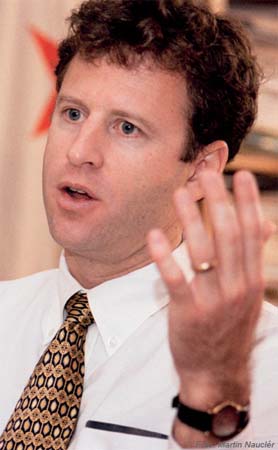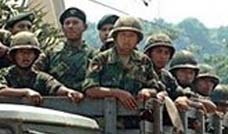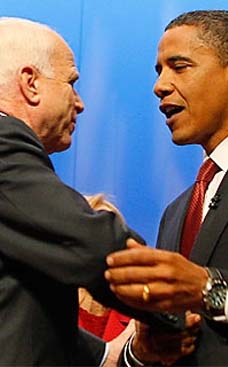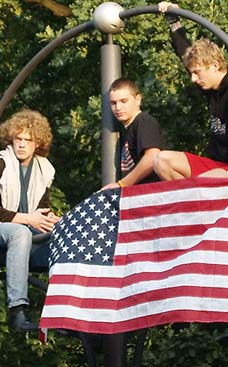
"How should either a President McCain or President Obama move this mission forward from here? The new president will need to keep up pressure on Iraqis so that they make painful and courageous compromises and avoid viewing the U.S. presence as an open-ended commitment. But we also need to remember that U.S. strategy does require patience and resolve — and a stabilizing troop presence. That formula has, after all, been working. Perhaps two parts McCain, one part Obama would be a recipe for closure — and yes, success in Iraq. "Michael O'Hanlon, a Senior Fellow at the Brookings Institute and a Visiting Lecturer at Princeton University, served as a Peace Corps Volunteer in Congo Kinshasa.
Michael O'Hanlon writes: How to finish the job in Iraq
How to finish the job in Iraq
A patient withdrawal could include two parts McCain, one part Obama.
By Ann Gildroy and Michael O'Hanlon
Ohanlon Iraq, anyone?
You can hardly blame the presidential hopefuls or the American people — for paying more attention to the financial crisis than to the war half a world away. Even so, come Jan. 20, a new commander in chief will inherit the Iraq conflict.
So whom should Americans trust in this election when the subject turns to Iraq? As it turns out, the best vision going forward is one that incorporates the thinking of Sen. John McCain and Sen. Barack Obama.
(Web Bryant, USA TODAY)
Obama accuses McCain of having predicted an easy war back in 2002 and early 2003. For his part, McCain rebukes Obama for failing to recognize the stakes in Iraq, or the remarkable success of the surge. Meanwhile their running mates play to the extremes, with Alaska Gov. Sarah Palin arguing that Obama/Joe Biden would wave "a white flag of surrender" and Biden saying McCain plans an ongoing war with "no end in sight."
Neither Palin nor Biden has it right. Obama's plan for pulling out all 15 combat brigades could be very risky. In fact, we think it is. But at a time when Iraqis are themselves clamoring for a time horizon for U.S. troop withdrawals, it no longer seems reckless. McCain's plan for being patient in our withdrawal hardly amounts to a war without end. In fact, the logic of a population-protection strategy in Iraq that McCain supports might have most forces out by 2011 or 2012.
The most meaningful question for voters, though, is what needs to be done next? After all, the pragmatic U.S. electorate is much more interested in plans for the future than rehashing the past.
Best of both worlds
Based on what one of us (Gildroy) saw during three tours in Iraq and the other (O'Hanlon) has seen in several research trips there, it is possible to think about an exit strategy of most of our forces during the next president's first term that combines elements of both candidates' ideas. McCain's calls for caution, care and flexibility in drawing down are, on balance, prudent. A solid strategy for Iraq might be thought of as using two parts of McCain's plan for every one of Obama's. But each offers something.
McCain is right to note the remarkable progress in Iraq over the past two years, while understanding that Iraq's war wounds are still fresh and the progress therefore still fragile. He also properly recognizes the high stakes. Obama correctly notes that we must not let the Iraqis believe that our commitment is open-ended, and his talk about a relatively rapid end to the conflict resonates with political realities in Iraq and the U.S.
Think of it this way. Working with our brave Iraqi allies, we are about two-thirds of the way done, but the job is hardly finished. Iraq does not have to be a democratic paradise on the Tigris and Euphrates before we leave. But Americans and Iraqis do need to further reduce the risks of an al-Qaeda resurgence, a renewal of sectarian conflict, or militia warfare fueled by a meddling Iran.
Violence is down 80% in Iraq — a fantastic achievement. But to be durable, the Iraqi political system needs to work better across sectarian lines. There has been lots of progress — for example, an amnesty law and a pension act, and new legislation clarifying the powers of Iraq's 18 provinces and paving the way for winter elections. Yet the fate of the disputed oil-rich city of Kirkuk is unresolved, and there's no solid plan yet to help refugees return home. A critical question: How will Iraq fairly distribute oil revenue among all the provinces and sectarian groups?
A need to reconcile
War critics often claim that despite other progress, Sunni-Shiite reconciliation is unworkable, underscoring the failure of U.S. strategy. The actual situation is much more complicated and more promising, if also still fraught with danger.
Prime Minister Nouri al-Maliki has taken many critical steps to improve relations with Sunni Arabs. He has fired militia leaders from positions of power — people who are generally his fellow Shiites, who make up 60% of Iraq's population. His government has shared many more financial resources with Iraq's provinces over the past couple of years, including Sunni-dominated ones. Al-Maliki's government has also hired many Sunnis, including former Baathists who had positions under Saddam Hussein. The national police has roughly equal numbers of Sunni and Shiite leaders, and army units are mixing Sunnis and Shiites successfully as well.
But the progress could still be reversed, as major measures remain stalled. A case in point is the "Sons of Iraq." These individuals are largely tribal fighters, about 80% Sunni. The U.S. hired them to help provide local security in places such as Anbar province — and to persuade them not to fight us. But al-Maliki has mixed views on the program, and efforts to fold these fighters into the security infrastructure have been halting. Only 10% have been given jobs. Even so, as progress is measured, Sunni-Shiite reconciliation is advancing rather than receding.
So how should either a President McCain or President Obama move this mission forward from here? The new president will need to keep up pressure on Iraqis so that they make painful and courageous compromises and avoid viewing the U.S. presence as an open-ended commitment. But we also need to remember that U.S. strategy does require patience and resolve — and a stabilizing troop presence. That formula has, after all, been working.
Perhaps two parts McCain, one part Obama would be a recipe for closure — and yes, success in Iraq.
Michael O'Hanlon is a senior fellow at the Brookings Institution in Washington. Capt. Ann Gildroy is a Marine Corps officer who has served three tours in Iraq.













